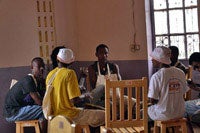News
Using Social Media to Empower Madagascar’s Youth
- 28 October 2013
News
ANTANANARIVO, Madagascar — On the island nation of Madagascar, more than half of the population is under 20 years old and over one in three girls becomes pregnant before her 18th birthday. But talking about sex remains taboo, which makes Manantsoa Ratsarazaka’s accomplishment all the more remarkable.
A confident and charming 23-year old, Manantsoa is the founder of Tanora Garan'Teen (Guarantee for Youth), one of the first youth-driven social media projects to encourage young people in Africa to talk about their sexual and reproductive health and rights, and to offer them reliable information on the subject.
Madagascar has experienced an upsurge in the number of adolescent pregnancies in the past 15 years, a trend that has been putting pressure on the health care system. Currently, 36 per cent of women aged 20-24 have reported a birth before age 18.
Observing how urban youth are connected by their mobile phones and the Internet, Manantsoa got the idea to use social media to educate young people about sexual and reproductive health. He gathered a team of 20 volunteers to run the project and secured three coaches to support them – two from the Ministry of Youth and one from the UNFPA Country Office in Madagascar.
“Tanora Garan'Teen is a project BY, FOR, and WITH young people in Madagascar,” is the tagline on the group’s Facebook page. Using platforms like Twitter, YouTube and Facebook, the project’s main objective is to facilitate adolescents’ and youth's access to information about sexual and reproductive health by encouraging them to share information, express their opinions and seek advice that will help them make informed decisions.
Through this virtual community, thousands of young people are empowered to discuss anything from sexual health and sexuality, to HIV/AIDS and adolescent pregnancy.
Manantsoa is driven by a determination to give youth the power and the means to make decisions about their families and their future.
“Malagasy people are generally shy when talking about sexual matters. Most questions or concerns are ascribed to a ‘friend’ or a ‘cousin’” says Manantsoa.
But he manages to put them at ease, speaking with the poise of a medical professional about everything from obstetric fistula to using condoms.
The young volunteers in Tanora Garan’Teen are not afraid to raise taboo topics that their parents might not dare discuss but that are important for adolescents and youth to know about. The volunteers also encourage members to become involved in civil society organizations and participate in decision-making processes.
Since the project began in 2012, it has reached more than 10,000 people through various events and focus groups across its social medial platforms. Because it enables participants to maintain their privacy, Tanora Garan’Teen has attracted more young people to take part in its online activities.

The questions that are asked on the Tanora Garan'Teen online platforms reveal the lack of access to basic information that is typical among Madagascar’s youth. For instance, one young man who contacted the organization was worried that his sperm would go into his brain if he did not have regular sexual relations.
Manantsoa knows that he needs to respond objectively and sensitively to each question.
"We never judge - that is the most important,” he says. “We go deeper to search for the real problem. We get all necessary information before giving advice. Then we try to explain, using science, how it works."
“Questions about sex are always the last to be asked. Usually, it seems that it is more issues about love and relationships that young people bring up first,” Manantsoa says.
Girls in particular are quite shy, he explains. It may take several questions until they open up and discuss their concerns frankly. But often, they don’t know where else to turn. Recently, a pregnant 15-year-old girl contacted Tanora Garan’Teen for advice. Manantsoa and his team talked with her at length about how to stay healthy during pregnancy and childbirth and coached her about the choices she has once the baby is born.
“Tanora Garan’Teen is unique in the African context. Using the Internet as a communication channel is a strategic choice because social media among young people in Madagascar is on the rise,” says Ms. Agathe Lawson, UNFPA Representative in Madagascar. “The overall aim is to sensitize Madagascar's youth on sexual and reproductive health issues to help them make informed choices and facilitate an open dialogue on health, sexuality and the needs and concerns of young people.”
Manantsoa dreams of having a greater impact and hopes to establish Tanora Garan’Teen as an independent association that will recruit more health specialists and provincial representatives to prevent and sexual and reproductive health problems.